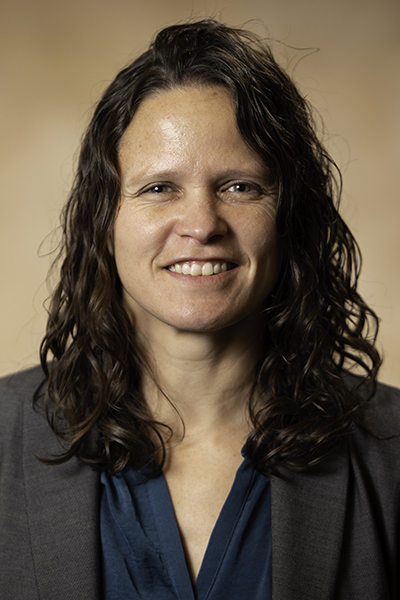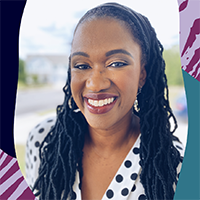Van Deinse builds community collaborations through social work research
by Matthew Smith
Tonya Van Deinse’s foray into the field of social work may have been ordinary, but the work she’s done over her 20-year career is anything but mundane.
“It’s a common thing for social workers,” said Van Deinse, a research associate professor with the University of North Carolina at Chapel Hill School of Social Work. “Many of us come into the profession for personal reasons. Later, those personal reasons become professional ones.”
Her first social work experiences came through observing family members and friends interacting with mental health services and the criminal justice system — two structures she now works with daily.

That’s when she found UNC.
Becoming a Tar Heel
She joined the University as a distance education student, allowing her to continue to work in residential treatment while earning her degree.
“Having the opportunity to work full-time and be able to go to graduate school was a big plus,” Van Deinse said. “UNC has a great social work program, so it was a win-win.”
In 2008, she earned her Master of Social Work and started a job within the public mental health service sector, but she wasn’t done with Chapel Hill.
“I came back for a lot of reasons,” she said. “I was a part of this community. It’s a great university; there is great support available and there are great people that work here. Plus, the program had a lot of real-world application. I saw that my work in class was very much relevant to what I did on a day-to-day basis. It was a great learning opportunity.”
Van Deinse returned to Carolina to pursue her doctorate and then later joined the ranks of the School’s faculty in 2015 as a clinical assistant professor. Remaining a part of the Tar Heel community was important to her and to her work.
Research focus
After beginning her role as teaching faculty, Van Deinse’s primary focus turned from the classroom to her research.
“When I started at UNC, I was on a teaching track,” Van Deinse said. “I was teaching full-time, but I started getting funding for more research and evaluation projects. As those research opportunities grew, I wasn’t able to teach as much and ended up switching tracks to my current research associate professor role.”
That funding now totals nearly $7 million as a primary or co-investigator over nearly two dozen grants from organizations including the National Institute of Mental Health, the federal Bureau of Justice Assistance, U.S. Department of Justice, and the North Carolina Governor’s Crime Commission.
“I work at the interface of mental health and the criminal justice systems,” she said. “I really focus on applying implementation science methods to complex interventions that span these public systems.”
For Van Deinse, that means getting systems — like mental and behavioral health services — to work together with parallel systems — like the criminal justice system — to produce better outcomes for clients and workers.
It’s a passion that has grown from her personal experiences.
“Think about it,” Van Deinse said. “The care your loved one receives if they go through these systems is directly related to the training the people working there receive. When those that are responsible for their care are trained incorrectly, or the systems themselves are not set up to treat them properly, how can we expect them to improve?
“Once you know that and once you see it, you can’t unsee it. For me, that was my initial inspiration. I saw firsthand as a social worker how these two systems interacted with one another, and, I thought, ‘This is not the way it should be.’ That idea made all this my passion.”
‘Change is slow’
Her current research project — part of a $550,000 funded award from the federal Bureau of Justice Assistance — focuses on developing and testing tailored implementation strategies that enhance collaboration networks between behavioral health service providers and mental health probation officers.
“Everyone — and that includes social workers — has to break down the barriers to collaboration and address our own attitudes about working across organizations. It’s such a disservice to our clients — it’s not our show, but our personal attitudes about working across systems get in the way of client care. And that is unacceptable.”
— School of Social Work Research Associate Professor Tonya Van Deinse
That means bringing health experts from the behavioral and mental health system into contact with community supervision officers from the criminal justice system and providing them tools to help them connect their supervisees to behavioral health treatment and other supports they need to remain stable in the community.
Changing organizational behavior, however, is difficult. When systems have created a culture where collaboration is not part of the process, showing them how it can be beneficial takes time.
“Change is slow,” Van Deinse said. “In some organizations, working together is what’s normal. They collaborate every day. In other places, they don’t do that; it’s not part of their culture. Sometimes places do not have a lot of incentive to work together.”
“There’s still a long way to go,” she said. “Everyone — and that includes social workers — has to break down the barriers to collaboration and address our own attitudes about working across organizations. It’s such a disservice to our clients — it’s not our show, but our personal attitudes about working across systems get in the way of client care. And that is unacceptable.”
Building relationships
That mindset has fostered plenty of relationships that Van Deinse relies on today. At the heart of her research is a community engagement mindset.
“What I am most proud of are the longer-term relationships I’ve built with communities and growing them even more,” Van Deinse said. “When I go into a community or partner with an organization it’s the same approach: listen to them and then figure out how to do the thing that they think ought to be done. It’s not doing what I think should be done. It can take a lot of practice to learn to put your own interests and priorities aside and really listen.
“That’s what I really enjoy doing,” she said “It’s getting to know what makes my partners do what they do; learning how they see things; figuring out what they want to change; and then determining how I can use my skill set to make things happen for them.”
Building those relationships is one of her favorite parts of her job and she’s spent years developing them across the state.
“Dr. Van Deinse’s commitment to connecting our probation and parole officers with community-based providers is an essential element of our Specialty Mental Health Probation initiative,” said Sonya Brown, a social work administrator with the Community Supervision Division of the North Carolina Department of Adult Correction. “She is exceptional at using her research findings and knowledge of health and legal systems to bridge those gaps.”
Although she’s accomplished a lot through her research, Van Deinse wants to keep pushing the status quo.
“Ambitiously, I want to break down the idea that we can’t work together because of ‘XYZ,’” she said. “Often times we are working with the same population of people across all of these different systems, yet we treat them in silos. We have to stop thinking about people as part of just one system. Our solutions have to involve multi-system approaches.”
Classroom impact
Van Deinse’s relationships have not only benefitted her research, but her students as well.
“I still teach because I cannot help it,” Van Deinse said. “The specific course I teach now is a course on mental health and the criminal legal system. That ties in directly to my research.”
She has partners come to class so her students “don’t just have to listen to me.”
“Many of the speakers will be clinicians who are working within the criminal legal system — like a therapist at a jail for example — and they’ll talk about the services and support they provide to their clients,” Van Deinse said. “Hearing stories directly from these partners helps them see the change while continuing to critique and tweak systems.”
Ally Waters, a Carolina MSW graduate and current doctoral student, said the community partner visits can lead to career opportunities and helped her challenge her assumptions of social work values.
“Hearing from community partners helped me see the local landscape of services, stakeholders and issues from a vantage point outside the university,” Waters said. “Their accounts were honest, thoughtful and, sometimes surprisingly, relatable.
“It’s one thing to consider an idea theoretically and another thing to see it unfold in real time through dialogue. In fact, it was a community partner who told (our) class that social workers need to, ‘Look in our own backyards first,” before assuming we held the moral high ground. This continues to shape how I approach interdisciplinary work at the intersection of mental health and criminal legal systems.”
And Van Deinse’s advice for students? Invest in yourself.
“From my own experiences, as a student you’re making an investment in yourself, your career and your future,” she said. “It’s a little cheesy, but it’s true. You’re choosing to make this investment, do something with it. You can get letters behind your name anywhere, but you came here to make an impact. Take advantage of being here and make something of your experience.”
Related stories

Associate Professor Rachel Goode works to achieve health equity for Black women
Rachel Goode, recently promoted to associate professor at the School of Social Work, has worked to bridge the divide between research in the areas of obesity and eating disorders.

Lombardi investigates social work workforce data
We spoke with Research Assistant Professor Brianna Lombardi to learn more about how she investigates the social work workforce with an eye on integrated health care teams.

